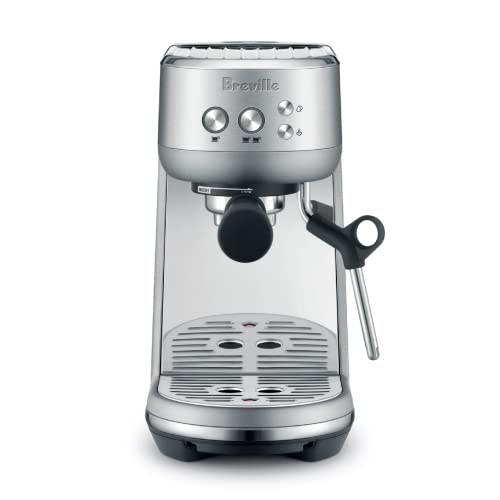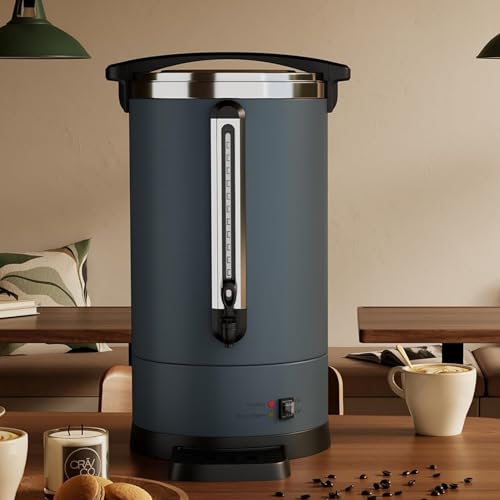Slow Cooker Recipes: Easy Meals, Less Effort!
Family-friendly dishes for busy people — quick prep, delicious results.
Grab yours for $4Are you torn between ground coffee and coffee pods for your morning brew? This classic coffee conundrum affects millions of coffee lovers worldwide who want to balance convenience with quality and cost.
When choosing between traditional ground coffee and modern coffee pods, you’re not just picking a brewing method—you’re selecting an entire coffee experience. Both options offer distinct advantages that appeal to different lifestyles, preferences, and priorities. Ground coffee delivers customization and rich flavors, while pods provide consistency and convenience without the cleanup.
What Are Coffee Pods and Ground Coffee?
Coffee pods are single-serving capsules containing pre-measured, pre-ground coffee sealed in a container designed for use in compatible brewing machines. These small packages come in various flavors and roasts, offering a quick brewing solution with minimal preparation. Most coffee pods feature a plastic or aluminum shell containing 7-12 grams of coffee, precisely portioned for a standard cup.
Ground coffee consists of roasted coffee beans that have been processed through a grinder to create smaller particles suitable for brewing. The coarseness varies depending on your brewing method – from fine grounds for espresso to coarse grounds for French press. A typical bag contains 12-16 ounces of ground coffee, yielding approximately 40-60 cups depending on your preferred strength.
The fundamental difference between these options lies in their preparation approach. Coffee pods represent a streamlined, modern solution focusing on speed and consistency. Ground coffee embodies the traditional method, offering greater control over variables like grind size, coffee-to-water ratio, and brewing time.
The Cost Comparison: Ground Coffee vs Pods
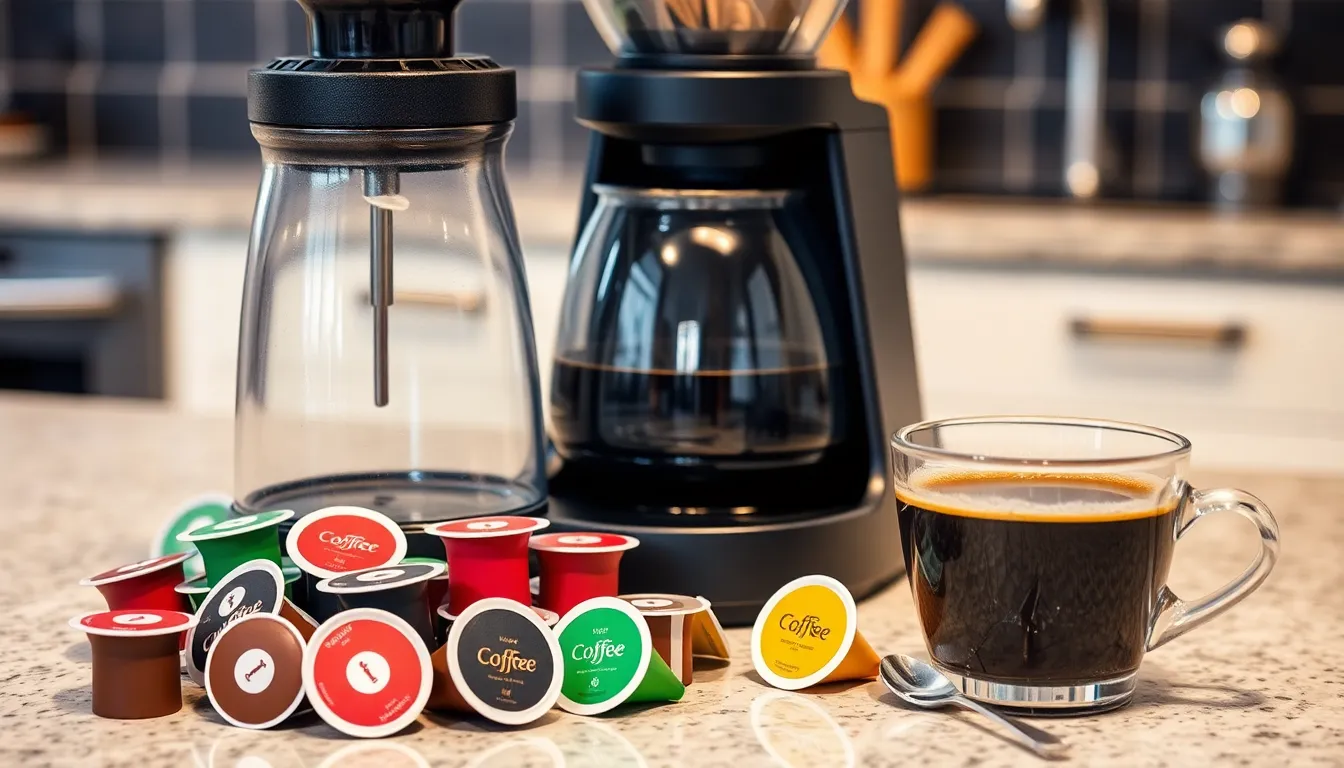
When choosing between ground coffee and pods, cost becomes a important factor in your decision-making process. Both options have different financial implications that extend from initial setup to daily brewing expenses.
Initial Investment
Getting started with ground coffee requires purchasing a grinder and brewing equipment such as a drip coffee maker or French press. These essential tools typically cost between $50 and $200, depending on the quality and brand you select. Your investment varies based on whether you opt for basic equipment or premium devices with additional features.
Pod-based brewing systems have a similar entry point financially. A pod-compatible coffee maker ranges from $70 to $200, with popular brands like Keurig and Nespresso offering machines at various price points. The advantage here is that no separate grinder is required, making your initial setup more straightforward.
Cost Per Cup
The long-term economics strongly favor ground coffee for your daily consumption. A pound of ground coffee typically costs between $6 and $10, yielding approximately 30 cups. This translates to just $0.20 to $0.33 per cup, making it a budget-friendly option for regular coffee drinkers.
Coffee pods carry a significantly higher per-cup cost. Each pod ranges from $0.40 to $1.10, depending on the brand and type you prefer. When calculated by equivalent weight, pods cost roughly $40 to $50 per pound—about five times more than traditional ground coffee.
| Coffee Type | Cost per Pound | Cost per Cup |
|---|---|---|
| Ground | $6 – $10 | $0.20 – $0.33 |
| Pods | $40 – $50 | $0.40 – $1.10 |
Many pod users find themselves weighing convenience against cost. The price difference adds up quickly for daily coffee drinkers, potentially amounting to hundreds of dollars annually compared to brewing with ground coffee.
Flavor Profile and Quality
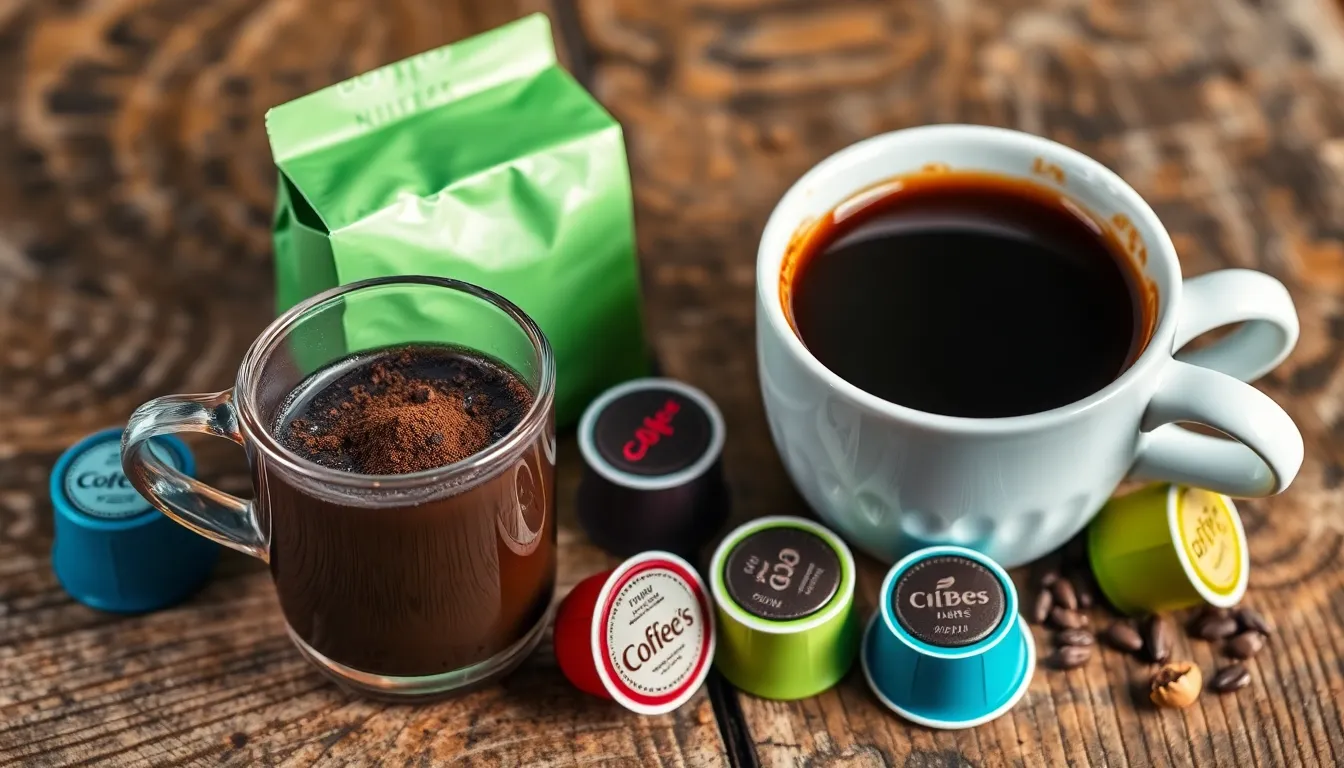
The taste experience differs significantly between ground coffee and coffee pods, with each option offering distinct advantages. Ground coffee typically delivers a more complex and nuanced flavor profile that many coffee enthusiasts prefer for its authenticity and depth.
Ground Coffee Flavor Experience
Ground coffee provides superior flavor quality because it’s often sourced from freshly ground beans. When you prepare ground coffee, you gain complete control over the brewing process, adjusting variables like water temperature, brewing time, and coffee-to-water ratio to extract optimal flavor. The flexibility to use various brewing methods—French press, pour-over, drip, or espresso—allows you to highlight different characteristics of the beans. Freshly ground coffee preserves delicate aromatic compounds that contribute to a richer, more multidimensional taste experience with noticeable top notes, body, and finish that pod systems sometimes fail to capture.
Coffee Pod Flavor Consistency
Coffee pods deliver reliable taste consistency from cup to cup due to their precise pre-measured portions. Premium pods from established roasters can provide good flavor quality, though they lack the depth found in freshly ground options. The sealed nature of pods means some aromatic compounds may diminish before brewing, slightly reducing complexity. Pod systems standardize brewing parameters, creating dependable results but limiting customization opportunities that might enhance certain coffee characteristics. Many coffee pod manufacturers have improved their offerings with specialty blends and single-origin options to address quality concerns, narrowing the flavor gap between the two brewing methods.
Freshness Factor
Coffee pods excel in preserving freshness through individual nitrogen-flushed sealed packaging. This airtight environment protects ground coffee from oxygen, moisture, and light—the primary enemies of coffee freshness. Each pod remains sealed until the moment of brewing, ensuring consistent flavor across months of storage. The controlled packaging prevents the oxidation process that typically degrades coffee quality over time.
Ground coffee begins losing freshness immediately after grinding, with flavor compounds evaporating and oils oxidizing rapidly. Even when stored in airtight containers away from light and heat, ground coffee typically maintains peak flavor for only 1-2 weeks after opening. This freshness limitation requires more frequent purchases or grinding smaller batches to maintain optimal taste. Some coffee enthusiasts address this by grinding beans immediately before brewing, though this adds time to the preparation process.
Variety and Selection
Coffee pods offer extensive flavor variety in convenient single-serving packages. Major pod manufacturers like Keurig, Nespresso and compatible brands produce hundreds of different options spanning multiple roast levels, flavor infusions, and blends from various origins. This variety enables easy experimentation without committing to an entire bag of beans. Limited edition and seasonal pods provide additional options for exploring different taste profiles without important investment.
Ground coffee provides unparalleled selection depth, including specialty single-origin beans, micro-lot offerings, and ethically sourced options that pod systems may not match. The market for ground coffee encompasses everything from mass-produced commercial blends to artisanal small-batch roasts with unique flavor characteristics. Coffee connoisseurs appreciate the ability to adjust grind size based on brewing method, further expanding taste possibilities. Many specialty roasters focus exclusively on ground coffee, creating distinctive blends and processing methods that haven’t transferred to pod formats due to volume constraints or quality concerns.
Environmental Impact
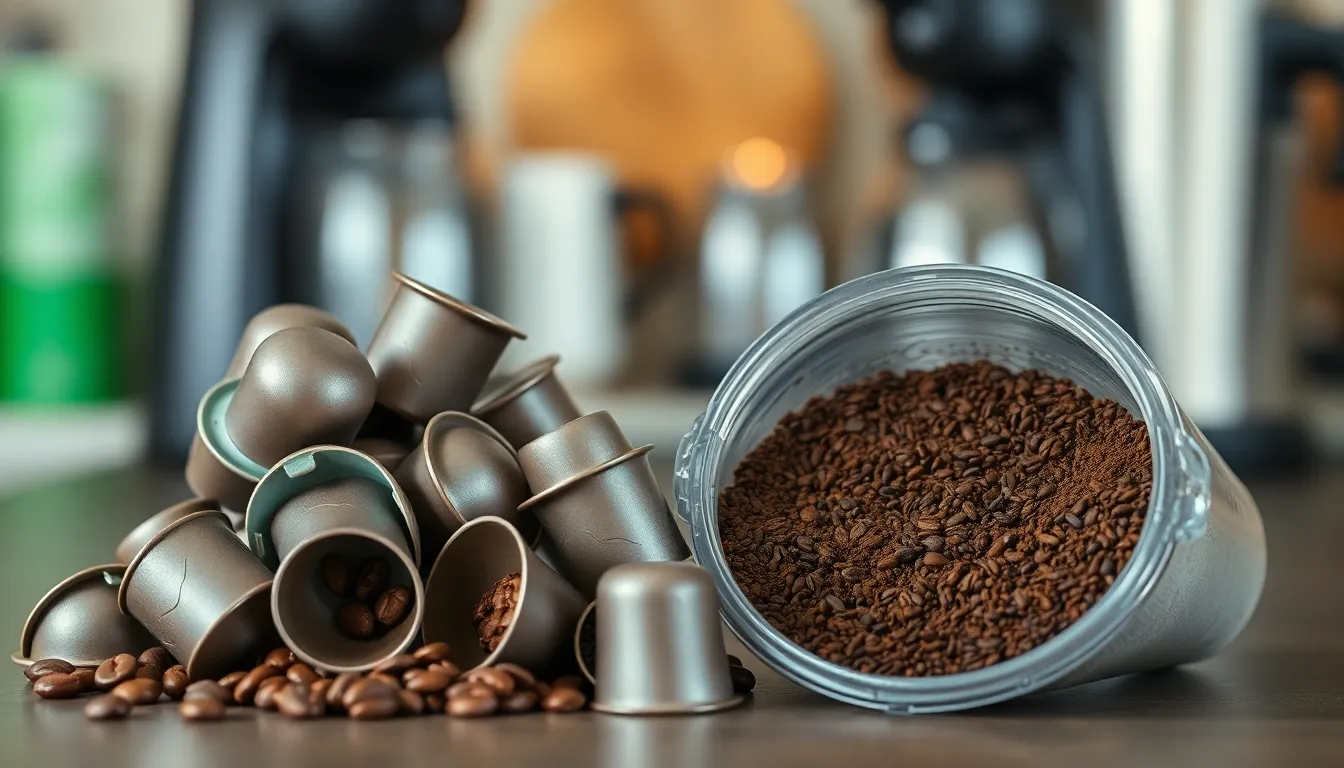
The environmental footprint of your daily coffee ritual extends far beyond the cup. Coffee production methods significantly impact resource consumption, waste generation, and sustainability efforts across the global coffee industry.
Waste Generation
Coffee pods generate substantial waste due to their single-use materials, with over 59 billion pods produced globally in 2018. Most capsules combine plastic or aluminum with organic materials, creating disposal challenges since these mixed components aren’t easily recyclable. When improperly discarded, pods contribute significantly to landfill volume and potentially release toxins harmful to marine ecosystems. Ground coffee, by contrast, primarily produces organic waste in the form of coffee grounds. These grounds are fully compostable and serve as excellent natural fertilizers for gardens, reducing landfill contributions and associated methane emissions. The compostable nature of coffee grounds creates a circular resource system that benefits soil health rather than contributing to environmental degradation.
Sustainability Efforts
Major pod manufacturers have responded to environmental concerns by developing more eco-friendly alternatives. Recyclable aluminum capsules offer infinite recycling potential, while new biodegradable pod options decompose naturally after use. Several companies now operate specialized recycling programs designed specifically for coffee pods, though these programs require consumer participation to be effective. Ground coffee inherently offers sustainability advantages through minimal packaging requirements and compostable waste. Its environmental impact varies depending on brewing methods—paper filters add waste unless composted, while metal filters provide a zero-waste alternative. The sustainability equation also includes coffee consumption efficiency, with ground coffee typically using more beans per cup (approximately 15.39 grams) compared to pods (5-10 grams), resulting in higher agricultural resource demands. Carbon emissions differ significantly between brewing methods, with pod-based coffee generating between 200 to 644 grams of CO2 per cup regardless of pod type, primarily due to manufacturing processes and materials.
Convenience and Ease of Use
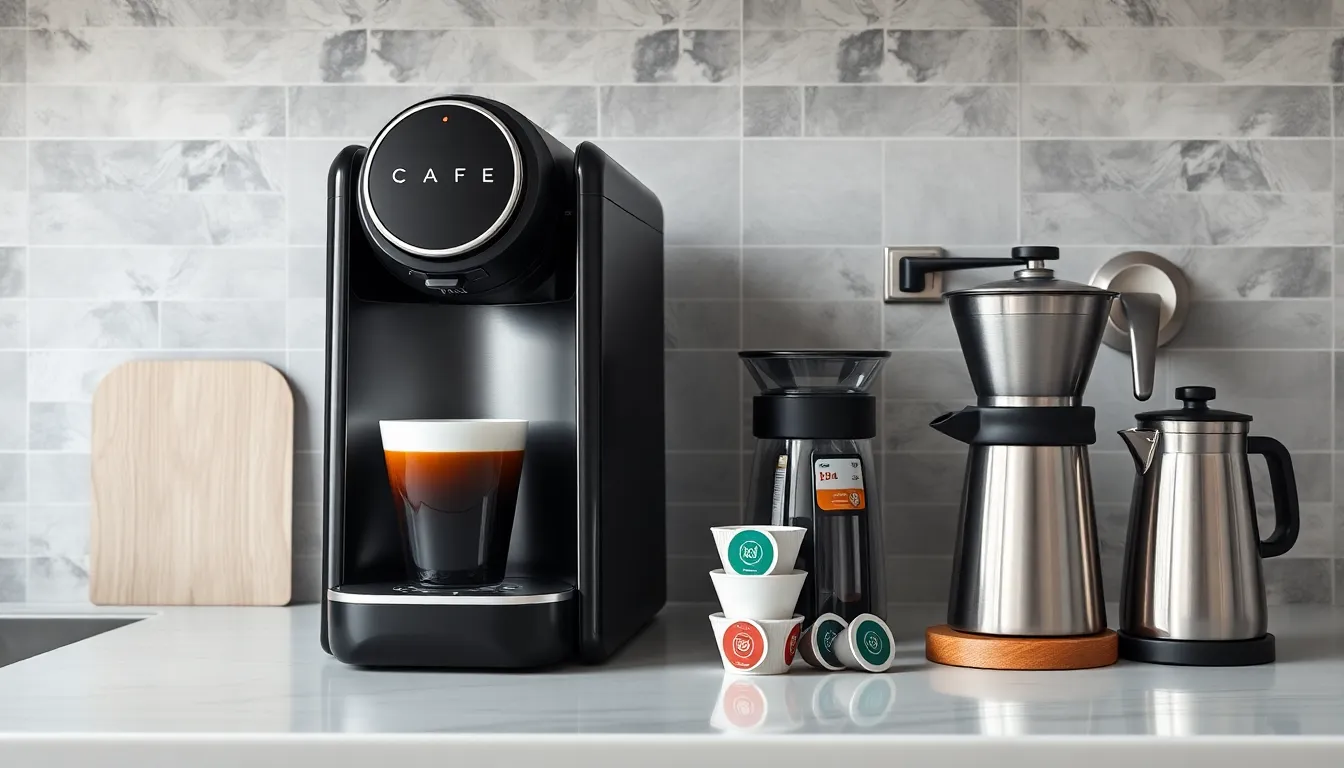
The convenience factor plays a crucial role in determining which coffee option fits best into your daily routine. Your morning coffee ritual directly impacts how your day begins, with time constraints often dictating your brewing method choice.
Brewing Time
Coffee pods deliver exceptional speed with brewing times of mere seconds per cup. These single-serve options require virtually no preparation—simply insert the pod into your compatible machine, press a button, and hot water instantly passes through at high pressure. You’ll have a perfectly brewed cup in under a minute, making pods ideal for rushed mornings or quick coffee breaks.
Ground coffee requires a more involved process with variable brewing times depending on your preferred method. Drip coffee makers typically need 5-10 minutes to complete a cycle, while French press brewing demands 4-5 minutes of steeping after boiling water. Espresso machines using ground coffee require measuring, tamping, and extraction time, though the actual brewing takes only 25-30 seconds once set up. These additional steps create a time investment that many coffee enthusiasts find worthwhile for the resulting flavor.
Cleanup Considerations
Coffee pods excel in minimizing post-brewing cleanup efforts. The used grounds remain completely contained within the pod, eliminating counter spills and messy filters. You’ll simply eject the spent pod from your machine and discard it—a process taking seconds with no residue to wipe or grounds to dispose of separately.
Ground coffee creates more cleanup challenges throughout the brewing process. Loose grounds frequently spill during measuring and transferring, requiring counter wipedowns. After brewing, you’ll need to dispose of wet coffee grounds from filters, portafilters, or French press screens. These grounds can clog sinks if not properly discarded, and brewing equipment requires thorough rinsing or washing between uses. Many coffee enthusiasts accept this tradeoff, finding the cleanup ritual part of the traditional coffee experience.
| Factor | Coffee Pods | Ground Coffee |
|---|---|---|
| Daily Preparation | Insert pod, press button | Measure, grind, tamp, brew |
| Brewing Speed | 30-60 seconds total | 4-10 minutes depending on method |
| Cleanup Time | Under 10 seconds | 1-3 minutes plus equipment washing |
| Counter Mess | Nearly none | Moderate with potential spills |
Which Option Is Right for You?
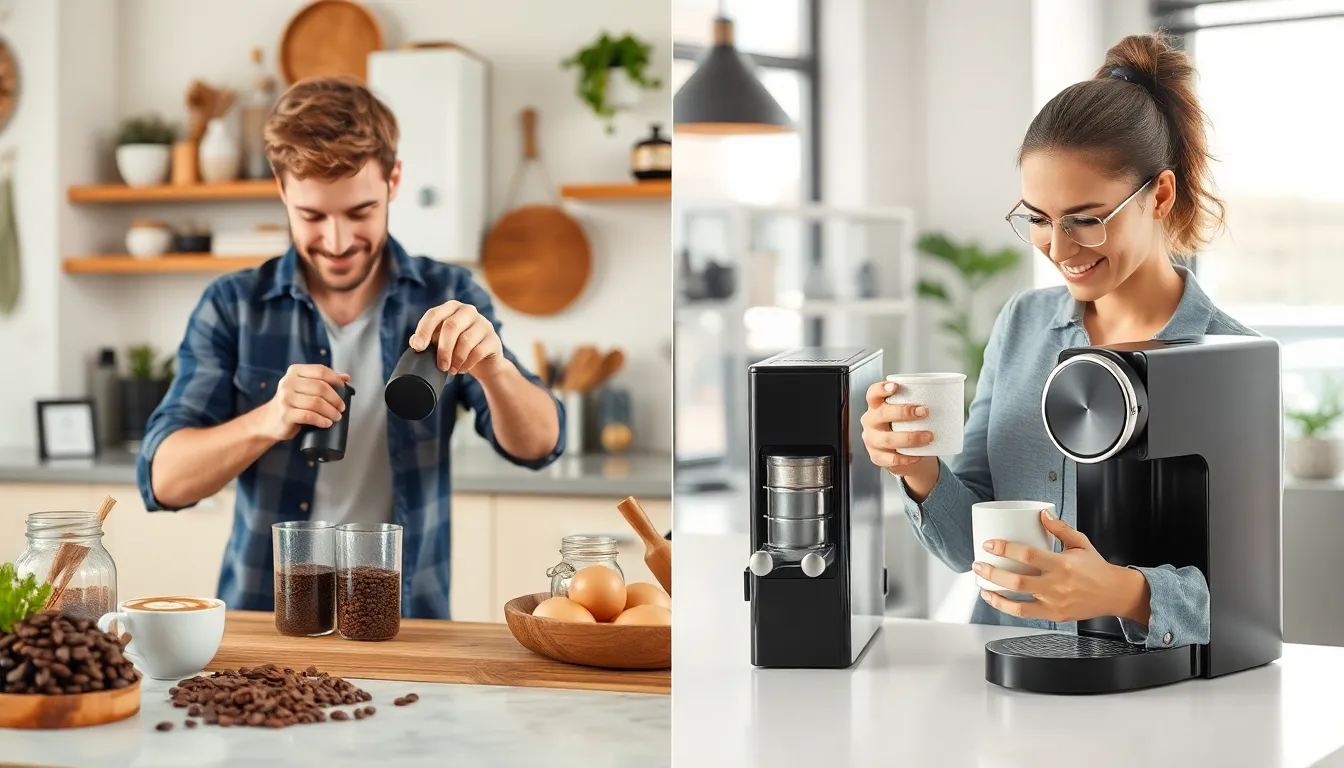
Your coffee preference eventually comes down to your lifestyle, priorities, and relationship with your daily brew. The right choice varies based on whether you’re someone who savors the ritual of coffee-making or needs a quick caffeine fix with minimal fuss.
For Coffee Enthusiasts
Coffee enthusiasts typically find greater satisfaction with ground coffee due to its superior customization options. You’ll appreciate the ability to select exact beans, adjust grind size according to your brewing method, and experiment with different extraction techniques. Ground coffee delivers more complex flavor profiles and nuanced notes that pre-packaged pods simply can’t match. Many coffee connoisseurs enjoy the meditative quality of the brewing process—measuring grounds, heating water to the perfect temperature, and watching the extraction unfold. The economic advantage becomes apparent over time, with premium ground coffee costing significantly less per cup than equivalent-quality pods. Also, the reduced packaging waste aligns with sustainability values that many coffee enthusiasts prioritize, especially when paired with reusable filters and ethically sourced beans.
For Busy Professionals
Busy professionals often gravitate toward coffee pods for their unmatched convenience and time efficiency. You can have a consistently good cup of coffee ready in under a minute with virtually no preparation or cleanup involved. Coffee pods eliminate the need for measuring, grinding, or dealing with messy filters, making them ideal for hectic mornings when every minute counts. The sealed pods preserve freshness and deliver reliable flavor every time, removing the guesswork from your morning routine. Office environments particularly benefit from pod systems, as they accommodate individual preferences without requiring multiple brewing setups. Pod machines also maintain a clean countertop appearance with minimal maintenance requirements—simply eject the used pod and you’re ready for the next cup. For professionals constantly on the go, the slight premium in cost per cup often feels justified by the time saved and hassle avoided.
| User Type | Best Option | Key Benefits |
|---|---|---|
| Coffee Enthusiasts | Ground Coffee | Superior flavor customization, cost-effective, more sustainable |
| Busy Professionals | Coffee Pods | Time-saving, consistent results, minimal cleanup |
Conclusion
The choice between ground coffee and pods eventually depends on what you value most in your coffee experience. If you prioritize rich flavors customization and cost-effectiveness ground coffee will serve you well. If convenience consistency and minimal cleanup matter most coffee pods are your ideal match.
Consider your morning routine lifestyle and environmental values when making your decision. Some coffee lovers even adopt a hybrid approach using pods on busy mornings and ground coffee when time permits for a more mindful experience.
Whatever you choose remember that the perfect cup of coffee is the one that fits seamlessly into your life while delivering the taste and experience you crave each morning.
Frequently Asked Questions
Are coffee pods more expensive than ground coffee?
Yes, coffee pods are significantly more expensive per cup than ground coffee. While a pod might cost $0.50-$1.00 per serving, ground coffee can cost as little as $0.10-$0.30 per cup. For daily drinkers, this difference can add up to hundreds of dollars annually, making ground coffee the more economical choice for budget-conscious consumers.
Which option delivers better flavor – ground coffee or coffee pods?
Ground coffee typically delivers superior flavor complexity and depth compared to coffee pods. With ground coffee, you can adjust variables like grind size, water temperature, and brewing time to enhance flavor profiles. Coffee pods offer consistent, reliable taste but often lack the nuanced flavors that coffee enthusiasts appreciate in freshly ground beans.
Are coffee pods bad for the environment?
Coffee pods create more environmental concerns than ground coffee due to their single-use plastic or aluminum construction. Many pods aren’t easily recyclable and contribute to landfill waste. While some manufacturers now offer recyclable or biodegradable alternatives, ground coffee produces compostable waste and requires minimal packaging, making it generally more eco-friendly.
Which option is more convenient for busy mornings?
Coffee pods win decisively for convenience. They brew a cup in under a minute with virtually no preparation or cleanup required – just insert the pod and press a button. Ground coffee requires measuring, potential grinding, brewing equipment setup, and more thorough cleanup afterward, making pods the ideal choice for rushed mornings.
How does freshness compare between coffee pods and ground coffee?
Coffee pods excel at preserving freshness since they’re individually sealed, protecting the grounds from oxygen and moisture. Once opened, ground coffee begins losing freshness within days, even when properly stored. For optimal flavor with ground coffee, experts recommend using beans within 1-2 weeks of grinding or grinding just before brewing.
Can I recycle coffee pods?
Some coffee pods are recyclable, but the process often requires extra steps like separating components or using manufacturer-specific recycling programs. Many mainstream pods still end up in landfills despite recycling claims. Check your specific pod brand for recycling instructions, or consider recyclable or compostable pod alternatives if environmental impact concerns you.
Which option offers more variety of flavors?
Both options provide excellent variety, but in different ways. Coffee pods offer convenient access to numerous pre-packaged flavor options and blends without buying multiple bags of coffee. Ground coffee provides unmatched selection depth with endless specialty varieties, regional selections, and the ability to blend your own custom combinations for unique flavor profiles.
Which is better for coffee enthusiasts versus casual drinkers?
Coffee enthusiasts typically prefer ground coffee for its superior customization, complex flavors, and traditional brewing experience. Casual or convenience-focused drinkers often favor coffee pods for their consistency, speed, and minimal cleanup. Your preference should align with whether you prioritize the coffee experience itself or the convenience of quick caffeine.




